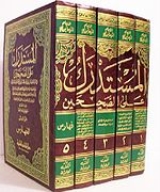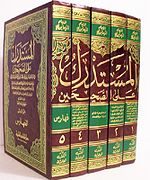
Al-Mustadrak alaa al-Sahihain
Encyclopedia

Hakim al-Nishaburi
Abu Abd-Allah Muhammad ibn Abd-Allah al-Hakim al-Nishaburi , and also known as Ibn Al-Baiyi.) was a Sunni scholar and the leading traditionist of his age, frequently referred to as the "Imam of the Muhaddithin" or the "Muhaddith of Khorasan."-Biography:Al-Hakim, who hailed from Nishapur, had vast...
d. 405H.
History
He wrote it in the year 393 AH (1002–1003 CE), when he was 72 years old. It contains 9045 hadith. He claimed all hadith in it were authentic according to the conditions of either Sahih al-BukhariSahih al-Bukhari
Ṣaḥīḥ al-Bukhārī , as it is commonly referred to, is one of the six canonical hadith collections of Islam. These prophetic traditions, or hadith, were collected by the Persian Muslim scholar Muhammad ibn Ismail al-Bukhari, after being transmitted orally for generations. Muslims view this as one of...
or Sahih Muslim
Sahih Muslim
Sahih Muslim is one of the Six major collections of the hadith in Sunni Islam, oral traditions relating to the words and deeds of the Islamic Prophet Muhammad. It is the second most authentic hadith collection after Sahih Al-Bukhari, and is highly acclaimed by Sunni Muslims...
or both.
Authenticity
The statement of authenticity was not accepted by a number of prominent later Sunni scholars. made an abridged version of the collection named Talkhis al-Mustadrak where he commented on its authenticity. It has become the habit of scholars today working in the field of hadîth, when compiling them and determining their authenticity, to say things like "It is authenticated by al-Hâkim and al-Dhahabî concurs". In doing so, they are referring to al-Dhahabi's Talkhîs, his abridgement of the Mustadrak that is often published along with it in its margins.Dhahabi also wrote:
The Mustadrak contains a good number of hadîth that conform to the conditions of authenticity of both (al-Bukhârî and Muslim) as well as a number of hadîth conforming to the conditions of either one of them. Perhaps the total number of such hadîth comprises half the book. There is roughly another quarter of the hadîth that have authentic chains of transmission, but that have something else about them or that have some defect. As for the rest, and that is about a fourth, they are rejected and spurious narrations that are unauthentic. Some of those are fabrications. I came to know of them when I prepared an abridgement of the Mustadrak and pointed them out.
al-Dhahabi lamented:
It would have been better if al-Hakim had never compiled it."
states that Mawdu'at al-Kubra
A Great Collection of Fabricated Traditions
A Great Collection of Fabricated Traditions, , is a collection of fabricated hadith collected by Abul-Faraj Ibn Al-Jawzi for criticism.-Description:...
is as unreliable in its attributing the grade of being "forged" to certain ahadith as al-Hakim's Mustadrak is unreliable in its declaring the grade of "sound" or Sahih to many ahadith.
Abridgment
Talkhis al-Mustadrak is an abridged version of Al-Mustadrak alaa al-Sahihain, written by Al-DhahabiAl-Dhahabi
Muhammad ibn Ahmad ibn `Uthman ibn Qaymaz ibn `Abd Allah, Shams al-Din Abu `Abd Allah al-Turkmani al-Diyarbakri al-Fariqi al-Dimashqi al-Dhahabi al-Shafi`i , known as Al-Dhahabi , a Shafi'i Muhaddith and historian of Islam.-Biography:...
. al-Dhahabi
Al-Dhahabi
Muhammad ibn Ahmad ibn `Uthman ibn Qaymaz ibn `Abd Allah, Shams al-Din Abu `Abd Allah al-Turkmani al-Diyarbakri al-Fariqi al-Dimashqi al-Dhahabi al-Shafi`i , known as Al-Dhahabi , a Shafi'i Muhaddith and historian of Islam.-Biography:...
in his Talkhis al-Mustadrak made an abridged version (a version with omitted material of the collection where he commented on its claimed authenticity). In that version, he added his comments on 1182 hadith. Al-Dhahabî in his encyclopedic Târikh al-Islam "The History of Islam" says the following in his biographical entry on al-Hâkim, wherein he speaks about his Mustadrak: "Some of those are fabrications. I came to know of them when I prepared an abridgement of the Mustadrak and pointed them out." al-Dhahabî said of it: "|It is a useful book. I had made an abridgement of it that is in considerable need of work and editing."
On at least three other occasions, al-Dhahabi citicised hadith he had not commented on in his Talkhîs. For example, when speaking about Mu`âwiyah b. Sâlih, he writes: "He is among those narrators whom Muslim accepts but not al-Bukhârî. You can see al-Hâkim relating this narrator's hadîth in his Mustadrak and say: 'This is according to the conditions of al-Bukhârî.' He repeatedly makes this mistake." However, when the same statement comes up in his Talkhîs, he says nothing about it .
There have been many prominent scholars who have assumed that al-Dhahabî's silence in his Talkhîs indicates his tacit approval of al-Hâkim's ruling, scholars of the caliber of al-Suyuti
Al-Suyuti
Jalaluddin Al-Suyuti also known as Ibn al-Kutub was an Egyptian writer, religious scholar, juristic expert and teacher whose works deal with a wide variety of subjects in Islamic theology. He was precocious and was already a teacher in 1462. In 1486, he was appointed to a chair in the mosque of...
in al-Nukat al-Badî`ât (197) (15th century CE), al-Manâwî in Fayd al-Qadîr, and al-Husaynî
Al-Husayni
Husayni is the name of a prominent Palestinian Arab clan formerly based in Jerusalem. Several members of the clan held important political positions such as Mayor and Grand Mufti of Jerusalem and founded and led many Palestinian Arab Islamist groups such as the Holy War Army, the Palestine Arab...
in al-Bayân wa al-Ta`rîf. Many contemporary scholars follow this view as well, but some question that stance.

